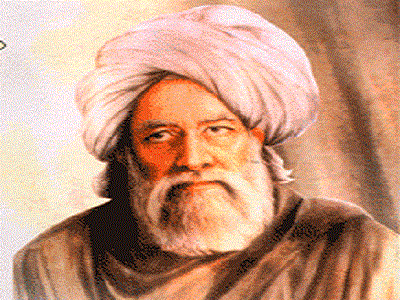Punjabi Love Poetry by Bulleh Shah
The poetry of Bulleh Shah
The greatest of Sufi lyrics in Punjabi

One of the greatest Sufi poets who wrote in Punjabi, Bulleh Shah's work has inspirations drawn from violence and also the idealism he derived from his mentor and his work.
Sufism is an experience or a way of life in which a practitioner indulges in discovering one's deeper identity or connecting with god. It is a tradition of enlightenment, some say; and it surpasses religious or cultural beliefs. Rooted in Islam, many writers, poets, singers, dancers and painters have been inspired by this mysticism, that the practice of Sufism enchants; and have given to the world a taste of their spellbinding, ecstatic Sufi experiences.
Sufism is said to have emerged out of Islamic asceticism, and as a practice to balance the increasing worldliness that an expanding Muslim community was experiencing. It first appeared in 661-749 as an act, which found Sufis meditating on the words of the Holy book of Quran, and later had Sufis experiencing the mysticism of divine love.
It is this outwardly and divine love that has inspired artists across cultures. One such , the greatest of all time, reckoned for his Sufi lyrics in Punjabi language is Bulleh Shah. An honorific name derived from Bullah, the pen name he preferred to use, instead of his given name Syed Abdullah Qadri. He lived in the part of Punjab, which is now in Pakistan, in the 17th century.
He lived and worked around a time when Punjab was seeing a great social upheaval and the control of Punjab by the Mughal rulers from Delhi was facing an increasing challenge from rebellions by Sikhs and other locals. These wars that Bullah lived find a mention in his poetry, besides his writings on his spiritual guide, Shah Inayat. Shah Inayat too was a noted Sufi master who wrote in Persian and his repeated references in Bullah's poetry are mark of the values he held for his master. Bullah's poetry is, in fact, also a reflection of a unison in culture that India and Pakistan share.
Written in Punjabi, a language used on either sides of the Indo-Pak border, Bullah's works have been sung by acclaimed Pakistani and Indian singers besides being published in two different scripts. Punjabi is a bi-scriptural language, written from right to left in Persian script and from left to right in Gurmukhi script.
Bullah's work was sadly not documented as and when created,was orally passed onto generations and only came to be collected in print collections in nineteenth century; and because of the modern waves that had blown over Punjab by now, many of the compositions during Bullah's period and earlier, using local dialects, could have been compromised in the process of collection and writing.
Usually transmitted from a pir or master to a disciple, Sufism reached a wider audience through poetry. The prime genre was the ghazal, a short love lyric, which was also popularised by the works of eminent poets such as Rumi.
Bulleh Shah's work predominantly comprise of Kafis, rhymed verses composed in simple syllabic meters with evenly distributed stresses. According to a book on his life and of translated works by Harvard University Press, Bullah's works would usually comprise of one or two versus as against the twenty versus or more generally used, and all the versus would have a strongly marked final rhyme usually consisting of two or more syllables. His most common of writing structures is evident in one of his most well known composition, "Bullah ki jaana main kaun…" (How does Bullah know who I am…).
Mostly regarded as folk songs, considering their writing styles, poems by Bullah have been sung by prominent Indian singers in past and continue to be, also indicating the widespread popularity of Sufism in India despite it being a wing of Islam.
Punjabi Love Poetry by Bulleh Shah
Source: https://mediaindia.eu/culture/the-poetry-of-bulleh-shah/